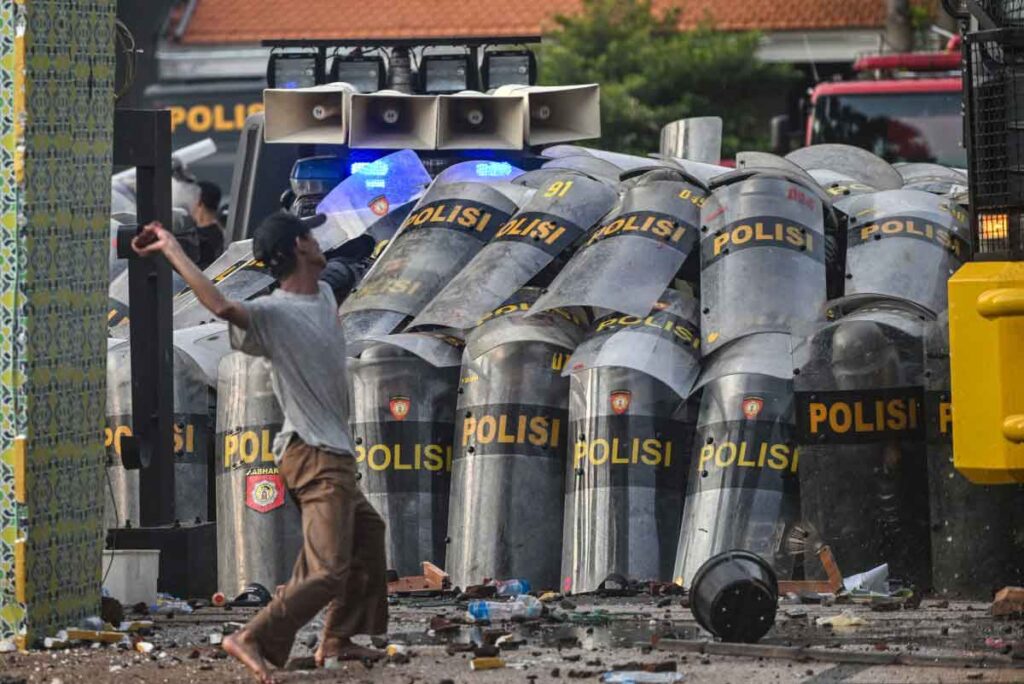June 26, 2025
JAKARTA – After months of street protests, public opposition to a recent revision of the Indonesian Military (TNI) Law that many see as potentially expanding the military’s power has moved into the courtroom, as the Constitutional Court has kicked off hearings for judicial review petitions against the law.
During a hearing on Monday, court justices heard from representatives of the government and House of Representatives about the petitions against the law revision that was passed in March.
Unlike other judicial review hearings where the government and House only send first or second echelon officials to the court, Monday’s hearing was attended by political bigwigs.
Indonesian Democratic Party of Struggle (PDI-P) lawmaker Utut Adianto, chair of House Commission I overseeing defense, as well as House Legislation Body (Baleg) chair Bob Hasan of Gerindra Party attended the hearing.
From the government side came Law Minister Supratman Andi Agtas, Defense Minister Sjafrie Sjamsoeddin, Deputy Law Minister Edward Omar Sharif Hiariej and Deputy Defense Minister Donny Ermawan Taufanto.
Both House and government representatives told the court that the justices should dismiss the petitions, claiming that the plaintiff’s allegations were unfounded.
Utut also argued that the plaintiffs, consisting of university students and activists, did not have a legal standing to file their petitions as they were not directly affected by the law.
“They are not active TNI members, prospective soldiers or employees in agencies that are potentially disadvantaged by the term of office that can be held by military personnel,” the PDI-P politician said
“[We hope] the court will reject the petitions in their entirety or at least declare their petitions inadmissible,” he continued.
Among the contentious articles in the TNI Law revision are the expansion of state institutions in which active military officers can be appointed without requiring them to resign or retire early from service. The law also broadens the scope of non-combat operations for the military and raises the retirement age for active-duty officers.
Critics argue that the articles will pave the way to the broadening of the military’s role in civilian affairs, marking the return of militarism that was rampant during former president Soeharto’s New Order regime.
Enough public input?
Plaintiffs also contested the law’s legitimacy, perceived lack of transparency and fast-tracked process behind closed doors, which sparked several protests nationwide under the banner of Indonesia Gelap (Dark Indonesia) before the House passed the bill.
Law Minister Supratman rejected the notion, claiming that the government and House had accommodated sufficient public participation when deliberating the bill.
“The government has received the public’s aspirations, both through meetings and focus group discussions, to form an inventory list of problems with the bill,” said Supratman, who is also a politician of President Prabowo Subianto’s Gerindra Party.
He shared Utut’s sentiment about the petitioners’ lack of legal standing, noting that the law did not concern “civil society organizations, students, activists and housewives”.
Among the five judicial review petitions heard, four were filed by law students at the University of Indonesia (UI), Gadjah Mada University (UGM) and Padjajaran University. Another petition was filed by Inayah Wahid, daughter of late president Abdurrahman “Gus Dur” Wahid, along with a coalition of civic groups advocating for security sector reform.
On June 5, the Constitutional Court dismissed five petitions, including those submitted by university students that challenged the TNI Law revision, because of their lack of legal standing to lodge a case.
At Monday’s hearing, Deputy Chief Justice Saldi Isra asked the government and House’s representatives why the revision went beyond the court’s mandate of only revising the retirement age.
“The basis of the constitutional order [to revise the law] is related to the retirement age, but now we see it has extended to other aspects. There needs to be an explanation for this,” Saldi said.
He and Justice Enny Nurbaninigsih also asked the lawmakers and officials to provide proof of documents that there had been sufficient public participation during the bill’s deliberations.
Utut and Supratman told the court they would respond in a written statement and provide the justices with the evidence.
Hunting masterminds
The military is now also looking for the “mastermind” behind the wave of online opposition against the revised TNI Law and the Indonesia Gelap movement.
TNI spokesperson Maj. Gen. Kristomei Sianturi said last Friday during a visit to the Attorney General’s Office (AGO) building that the military would look for figures behind the pushback against the law and their motive, as reported by Tempo.co.
Kristomei visited the AGO building to coordinate on the investigation of lawyer Marcella Santoso, who was allegedly involved in making negative reports and videos on social media about the attorney general and the TNI. The AGO arrested her after naming her suspect in a separate corruption case.
Usman Hamid, executive director of rights group Amnesty International Indonesia, slammed Kristomei’s comment, calling it “an attempt to delegitimize the community movement” that criticized the militarization of civil space through the Indonesia Gelap movement.

